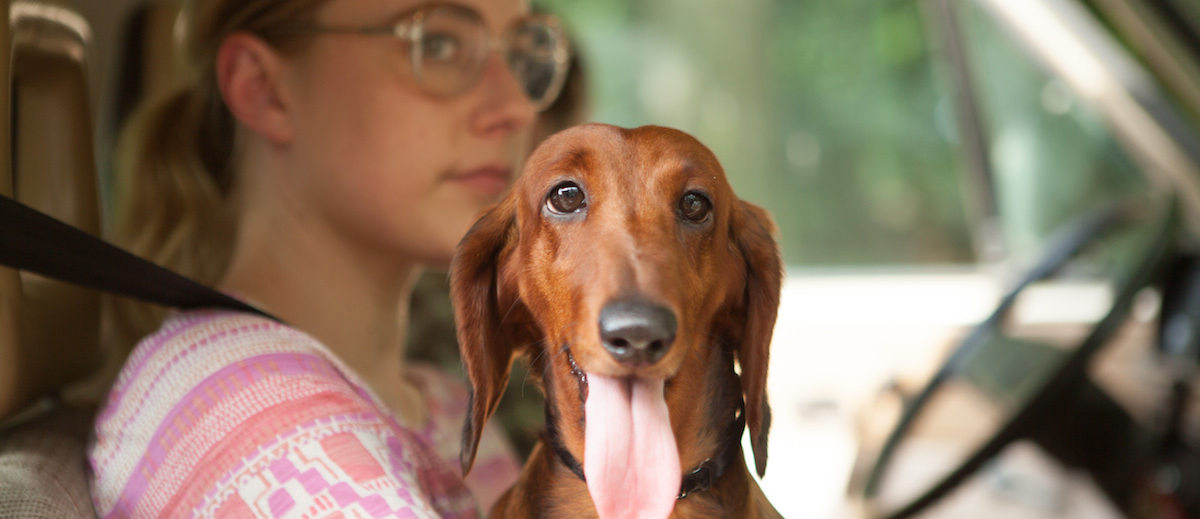“You have to break a dog to break their will.” “What is a ‘will,’ exactly, anyway?” “It’s character. It’s the thing that makes you you.”
If the “will” is the “thing that makes you you,” then breaking that will is tyrannical. Maybe a broken will is necessary to the social contract, as well as a part of the human condition, but there’s hardly any comfort in that. Todd Solondz doesn’t care about the audience’s comfort and his films have a ruthless, unblinking stare, almost refreshing in their uncompromising attitude (especially in comparison with the industry’s pathological desire for happy endings). Solondz rarely provides escape hatches. He presents reality, or reality as he sees it. Reality can be hilarious, absurd, touching. It can also be an exercise in futility. With all its humor (and there is a ton), “Wiener-Dog,” following the journey of a dachshund as it is shuffled from owner to owner, is one of Solondz’s sharpest visions of futility.
Early on, there is a slow horizontal pan down a line of caged dogs, lit in the sickly-green of buzzing fluorescence. It is surreal and elegant, putting us into the world-view of the creature we will follow. Disorientation is almost total for the dog. Just a moment ago, the dog knew where it was, who its “person” was. Everything changed in an instant. Each owner of the dog is further along down life’s path, and the dog is the witness to the passage of time. The owners flail in the void, searching for a handhold, something to make life meaningful.
Shot by Edward Lachman, two-time Oscar nominee (for “Far From Heaven” and “Carol“), “Wiener-Dog” enters and exits multiple worlds, following the dog’s destiny. It starts in an ultra-cool modern house with no personal objects in sight, not even in the child’s room. Remi (Keaton Nigel Cooke), a little boy with constantly bickering parents (Tracy Letts and Julie Delpy) is given the dog to comfort him after a serious illness. Neither parent is happy with this situation. (Dad is shown trying to train the dog, throwing vicious epithets its way). But Remi falls in love with the dog, naming it “Wiener-Dog” (the nickname of poor Dawn Wiener in Solondz’s “Welcome to the Dollhouse”). When the dog gets spayed, Remi is concerned that she will be scared and in pain; when the dog gets sick, Remi asks questions about death. Delpy handles her son’s anxieties in a mildly panicked and yet totally inappropriate way. “We don’t believe in God,” she tells her son. “Nature doesn’t care about animals,” she informs Remi. She relates the sad story of Croissant, her childhood dog who got pregnant (only she describes it as Croissant having been “raped by a dog named Mohammad”). Remi’s love of his dog, and the rapturous scene where the two tear apart the living room in slo-mo, is an ecstatic moment of uncomplicated joy and freedom, the best that dogs (and children) can exemplify.
The next owner is Dawn Wiener (all grown up from “Welcome to the Dollhouse” and now played by Greta Gerwig). Dawn rescues the dog who is about to be put to sleep from a vet’s office, cradling it in her arms. At a convenience store, she runs into Brandon, the boy she knew when she was a kid (played by Brendan Sexton in “Welcome to the Dollhouse” and here played by Kieran Culkin), and they have a stilted reunion where it’s clear that he can’t wait to get away from her. When he tells her that she looks like her dog, her face lights up. Dawn is cheery, pliable, caring, and susceptible. Brandon is on his way somewhere, and she decides to come along with her dog, and suddenly “Wiener-Dog” becomes a road movie. There’s a detached quality to Dawn (she sits on her bed, staring out the window, saying to herself simply: “I miss nothing here.”) A person with no attachments, she floats, and Greta Gerwig is a great “floater.” Dawn is like Remi in that she sees the pain in others (in the bitter Mariachi band they pick up along the way, in the troubled Brandon). The sequence is not exactly a hopeful sequel to “Welcome to the Dollhouse.” If Wiener-Dog is just along for the ride, then so is Dawn.
Danny DeVito is heartbreaking in his role as Dave Schmerz, a one-time successful screenwriter, who now teaches a course at a film school, universally disliked by his young heartless students who think he’s old and his advice worthless. Dave holds out hope he can sell his own script, but he can’t get his agent on the horn. He is in trouble with the administration for not being supportive enough of his students who breeze into his office saying they want to merge queer theory with epistemological concepts in their films, and then look annoyed when he asks “What is it about, though?” The film-school section of “Wiener-Dog” goes meta, similar to what Solondz was up to in “Storytelling,” addressing the critiques of his own work as well as his contempt for those who refuse to engage.
In the middle of all of this is an old-fashioned “Intermission,” showing the dachshund, now gigantic, strolling through Monument Valley, all to the crooning accompaniment of a Spaghetti-Western style song called “The Ballad of the Wiener-Dog.” It’s a biting commentary on the audience’s need for a “break.”
Ellen Burstyn is the final owner of the dog. An invalid, hidden behind dark sunglasses, she tolerates the visit of her twitchy anxious granddaughter Zoe (Zosia Mamet), artist boyfriend named Fantasy (Michael James Shaw) in tow. Zoe is eager to please, on the edge of tears, babbling about Fantasy’s art (“I’m interested in mortality,” announces Fantasy) and afraid of her formidable humorless grandmother (as well she should be). The scene, and the one that follows, is sweeping and surreal in its evocation of regret, loss, and roads not taken.
Things happen in the film that are unbearable or gross (one example being the lengthy horizontal-pan of the dog’s diarrhea trail), and Solondz lingers on it, forcing the audience to linger, too. His rage shimmers off the screen.
At one point, Zoe says to her grandmother with desperate brightness, “I’m still young!” and Burstyn snaps, “Don’t kid yourself.” That could be a summing-up of Solondz’s outlook on life. It’s not that there isn’t humor in life. Or joy. There is. But don’t kid yourself.




















